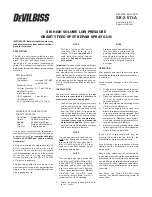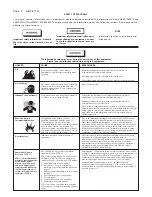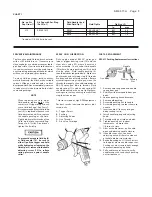
Page 2
SB-2-511-A
Important information that tells how to
prevent damage to equipment, or how
to avoid a situation that may cause mi-
nor injury.
NOTE
Information that you should pay special
attention to.
SAFETY PRECAUTIONS
This manual contains information that is important for you to know and understand. This information relates to USER SAFETY and
PREVENTING EQUIPMENT PROBLEMS. To help you recognize this information, we use the following symbols. Please pay particular
attention to these sections.
Important safety information - A hazard
that may cause serious injury or loss of
life.
The following hazards may occur during the normal use of this equipment.
Please read the following chart before using this equipment.
Fire
Solvent Spray
I
nhaling Toxic Substances
Explosion Hazard -
Incompatible Materials
General Safety
Cumulative Trauma
Disorders ("CTD's")
CTD's, or musculoskeletal
disorders, involve damage
to the hands, wrists,
elbows, shoulders, neck,
and back. Carpal tunnel
syndrome and tendonitis
(such as tennis elbow or
rotator cuff syndrome) are
examples of CTD's.
Solvent and coatings can be highly
flammable or combustible especially when
sprayed.
During use and while cleaning and flushing,
solvents can be forcefully expelled from
fluid and air passages. Some solvents can
cause eye injury.
Certain materials may be harmful if inhaled,
or if there is contact with the skin.
Halogenated hydrocarbon solvents - for
example; methylene chloride and 1,1,1, -
Trichloroethane are not chemically
compatible with the aluminum that might be
used in many system components. The
chemical reaction caused by these solvents
reacting with aluminum can become violent
and lead to an equipment explosion.
Improper operation or maintenance of
equipment.
Use of hand tools may cause cumulative
trauma disorders ("CTD's").
CTD's, when using hand tools, tend to affect
the upper extremities. Factors which may
increase the risk of developing a CTD include:
1. High frequency of the activity.
2. Excessive force, such as gripping,
pinching, or pressing with the hands and
fingers.
3. Extreme or awkward finger, wrist, or arm
positions.
4. Excessive duration of the activity.
5. Tool vibration.
6. Repeated pressure on a body part.
7. Working in cold temperatures.
CTD's can also be caused by such activities
as sewing, golf, tennis, and bowling, to name
a few.
Adequate exhaust must be provided to keep air free of
accumulations of flammable vapors.
Smoking must never be allowed in the spray area.
Fire extinguishing equipment must be present in the spray area.
Wear eye protection.
Follow the requirements of the Material Safety Data Sheet
supplied by your coating material manufacturer.
Adequate exhaust must be provided to keep the air free of
accumulations of toxic materials.
Use a mask or respirator whenever there is a chance of inhaling
sprayed materials. The mask must be compatible with the material
being sprayed and its concentration. Equipment must be as
prescribed by an industrial hygienist or safety expert, and be
NIOSH approved.
Due to the aluminum passageways in these guns, they must not
be used with these solvents. Aluminum is also widely used in
other spray application equipment – such as material pumps,
regulators, valves and cups. Check all equipment items before use
and make sure they can also be used safely with these solvents.
Read the label or data sheet for the material you intend to spray.
If in doubt as to whether or not a coating or cleaning material is
compatible, contact your material supplier.
Operators should be given adequate training in the safe use and
maintenance of the equipment (in accordance with the
requirements of NFPA-33, Chapter 15). Users must comply with all
local and national codes of practice and insurance company
requirements governing ventilation, fire precautions, operation,
maintenance, and housekeeping. These are OSHA Sections
1910.94 and 1910.107 and NFPA-33.
Pain, tingling, or numbness in the shoulder, forearm, wrist, hands,
or fingers, especially during the night, may be early symptoms of a
CTD. Do not ignore them. Should you experience any such
symptoms, see a physician immediately. Other early symptoms
may include vague discomfort in the hand, loss of manual
dexterity, and nonspecific pain in the arm. Ignoring early
symptoms and continued repetitive use of the arm, wrist, and
hand can lead to serious disability. Risk is reduced by avoiding or
lessening factors 1-7.
HAZARD
CAUSE
SAFEGUARDS





















